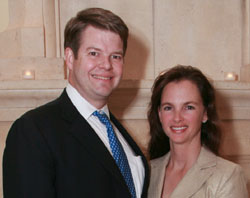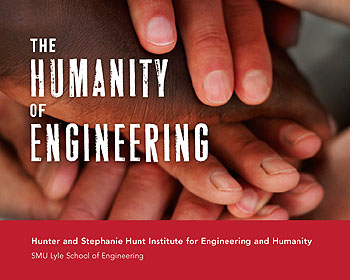SMU’s new Hunter and Stephanie Hunt Institute
to develop low-cost solutions for global poor
SMU’s new Hunter and Stephanie Hunt Institute will develop low-cost solutions for the global poor.

DALLAS (SMU) – Pairing technological innovation with business collaboration to improve conditions for the global poor is the driving force behind the new Hunter and Stephanie Hunt Institute for Engineering and Humanity at SMU's Bobby Lyle School of Engineering.
 Hunter and Stephanie Hunt Related Links: |
Gifts totaling $5 million from Hunter and Stephanie Hunt, William T. and Gay F. Solomon, Bobby B. Lyle and others will establish the institute and initially create two endowed professorships to support a unique, interdisciplinary approach to delivering basic technology to the impoverished.
Dr. Jeffrey Talley, chair of the Lyle School’s Environmental and Civil Engineering department and a U.S. Army Reserve general, will be the founding director of the institute, which is to be housed in the new Caruth Hall upon its completion in early spring.
“The Institute for Engineering and Humanity will accelerate the ability of the Lyle School of Engineering to serve as a magnet for the kind of students and researchers who seek solutions to societal challenges,” said SMU President R. Gerald Turner. “We are very grateful for the generosity of these donors, whose passion for improving the lives of others matches SMU’s commitment to global leadership.”
The institute strategy begins with the understanding that small-scale innovations already exist to solve many problems in poor communities, while others need to be modified to fit specific geographic and cultural needs. Safe, affordable and sustainable housing will top the Institute’s project list, as well as ready access to clean water and sanitation; functional roads and transportation systems, and clean, reliable energy. The institute will create innovative approaches to easing poverty by encouraging markets for its ultra low-cost solutions, based on the principle that sustainable business models are more likely to accelerate global development than traditional approaches.
The institute’s major components will include the following:
- an easily accessible library of existing technological solutions that are certified and ready for widespread dissemination and use
- a global database of regional technology gaps that need to be bridged to meet specific needs
- research and development of new ultra low-cost technologies involving SMU faculty, students and industry partners
- field testing and scaling of new products to ensure low manufacturing costs, durability, easy maintenance, and minimal impact on the environment
- assistance to businesses that will manufacture and maintain these technologies
“This will be no easy challenge,” said Geoffrey Orsak, dean of the Lyle School of Engineering. “To make basic technology globally available at a price the poorest of the poor can afford requires a radical rethinking of centuries of engineering practice. How many solutions have remained on the drawing board because they were too costly for communities that need them? How many have failed because they could not be locally repaired and maintained?”
It’s going to take talented, motivated engineers to identify solutions for alleviating poverty, Orsak said, adding that the success of this new institute can have a profound impact on people who struggle just to survive with dignity.

The Lyle School’s partnership with the renowned Lockheed Martin Skunk Works® will provide proven innovation methodologies to support the institute’s research and development efforts. The institute’s approach to finding affordable solutions also will include national and international competitions and incentives, particularly targeted to students.
The Lyle School will begin an international search for a scholar who has broad experience in developing technologies and infrastructure for emerging economies to become the William T. and Gay F. Solomon Endowed Professor in Engineering and Global Development. Institute director Talley will hold the Bobby B. Lyle Endowed Professor in Leadership and Global Entrepreneurship.
With three billion people in the world living on $2 a day or less, institute donors Hunter and Stephanie Hunt believe global poverty is one of the most pressing problems of our time. “There has been a great deal of financial and commercial innovation in helping the impoverished, but there has been little technical and engineering innovation; we hope to fill that void,” Stephanie Hunt said. “This new institute will take a creative but pragmatic approach to an immense challenge,” Hunter Hunt added.
Hunter L. Hunt is senior vice president of Hunt Oil Company and president of Hunt Power, L.P., both subsidiaries of Hunt Consolidated, Inc. of Dallas. He worked with the investment bank Morgan Stanley for almost eight years before joining Hunt Consolidated in 1998. Hunter Hunt graduated in 1990 with Bachelor of Science degrees in economics and in political science from SMU’s Dedman College.
Stephanie Erwin Hunt in 2008 founded Hunt Collaborative, a non-profit organization dedicated to bringing technology-driven solutions to people living in extreme poverty. She graduated from UT Austin with a Bachelor of Business Administration in finance in 1990, then studied with Sotheby’s in London before working with investment bank Wasserstein Perella. Stephanie Hunt is immediate past chairman of AFI Dallas International Film Festival and serves on the board of the da Vinci School.


###
A private university located in the heart of Dallas, SMU is building on the vision of its founders, who imagined a distinguished center for learning emerging from the spirit of the city. Today, nearly 11,000 students benefit from the national opportunities and international reach afforded by the quality of SMU’s seven degree-granting schools.